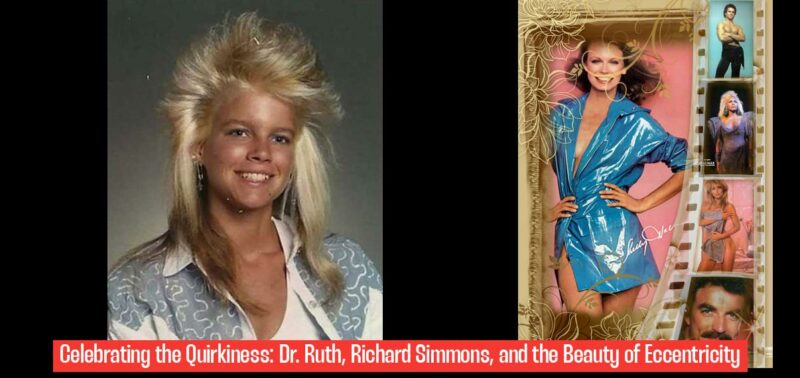Dr. Ruth, Richard Simmons, and the Joys of Eccentricity
The deaths of two inimitable 1980s figures are a reminder that our world needs more cheerful weirdos. For a child of the 1980s—like myself—the deaths of Ruth Westheimer and Richard Simmons over the past few days have been a reminder that we live in an era with a serious deficit in goofballs. They were true eccentrics. How else to describe a 4-foot-7 grandmother with a thick German accent doling out explicit sex advice with an impish giggle or an exuberant man in short shorts with a halo of curls who talked with his hands and implored everyone to sweat to the oldies?
Dr. Ruth and Richard Simmons were as brightly colorful as my Saturday-morning cartoons or my bowl of Trix. But looking back at them now as caricatures risks obscuring the subtle revolutions they helped bring about. Dr. Ruth pushed intimate conversations about sex into the open, discussing orgasms and premature ejaculation with Johnny Carson. Simmons took exercise and loving your body from the reserve of the chiseled and gave them to anyone unafraid to twist their hips with him along to the strains of “Great Balls of Fire.”
At the core of their celebrity was a total lack of self-consciousness. They broke taboos, not by judging society for its hang-ups, but by being game to say or do anything—even becoming the butt of the joke themselves. Did they know we were often laughing at them? Probably. But that seemed to be the point; that’s how they broke through.
Dr. Ruth: The Queen of Sexual Literacy
On her first The Tonight Show appearance, in 1982, Dr. Ruth, dressed in a red pantsuit, her hair a ginger cloud floating around an elfin face, sat down with Carson. Her feet dangled above the floor. “One has to discuss the issue of self-gratification in a context,” she said, as the audience tittered. Just the way she’d pronounce the word arousal (Uh-rous-ul) could make you smile. She once caused David Letterman to walk out of his own studio by sweetly describing the story of a widow who had called in to her show looking for masturbation advice; Dr. Ruth had suggested employing the help of a cucumber. (Letterman, that collector of glorious weirdos, had Dr. Ruth and Simmons as regular guests on his show.)
Dr. Ruth’s willingness to discuss sex openly and frankly was revolutionary. In the 1980s, sex was still a taboo subject, and many people were uncomfortable talking about it, let alone on national television. Dr. Ruth, however, was not afraid to tackle any topic, no matter how sensitive. She spoke about everything from orgasms and premature ejaculation to sexual health and relationships. Her frank and humorous approach made it easier for people to talk about sex and to learn about their own bodies.
Dr. Ruth’s impact on American culture is undeniable. She helped to break down the stigma surrounding sex and made it more acceptable for people to talk about their sexual health. She also helped to empower people to take control of their own sexuality. Her legacy is one of openness, honesty, and humor.
Richard Simmons: The King of Sweatin’ to the Oldies
When Simmons showed up on television in the 1980s, he was like some strange ethereal creature in a glittery tank top. He stared straight into the camera and gave simple advice about what we would now call healthy living and positive self-image. As he once put it in an interview, “You must eat on a regular basis, and you must eat correct food. You gotta exercise every single day. And you have to like you. Here’s the main thing that gets people in trouble: You have to like who you are. You have to believe in yourself.” His “Sweatin’ to the Oldies” videos are cringey, for sure. But the people moving behind him are truly of all sizes—they could have just spilled out of a random subway car—and they seem happy and comfortable, long before “body positivity” was an accepted concept. (Also worth noting: Those VHS tapes and DVDs have sold tens of millions of copies.)
Richard Simmons was a pioneer in the field of fitness. He made exercise fun and accessible to everyone, regardless of their size or shape. He created a welcoming and inclusive environment where people could feel comfortable moving their bodies and celebrating their individuality. His message of self-acceptance and body positivity was groundbreaking, and his impact on the fitness industry is still felt today.
Simmons’s impact on American culture is profound. He helped to change the way people thought about fitness and body image. He made it okay to be different and to celebrate your own unique body. His legacy is one of joy, acceptance, and self-love.
Trending Now — What Can Fans Expect from DC’s Expanded Presence and Lineup at SDCC 2024?
The Power of Authenticity
Perhaps the miseries they each survived growing up made them less concerned about being laughed at. Dr. Ruth was orphaned during the Holocaust. She came to Palestine after the war and joined the Haganah, the paramilitary group fighting for Jewish statehood, and was injured when a shell exploded near her legs. Eventually making her way to New York, she finally found her calling in her 50s, teaching what she called “sexual literacy,” first on her radio show, Sexually Speaking, and then seemingly everywhere. Simmons grew up in New Orleans a self-proclaimed “little fat kid” who weighed nearly 200 pounds at one point. He starved himself to try to lose weight and made himself extremely sick. Alienated from the then-dominant forms of exercise—and eschewing both the macho-ness of pumping iron and the perfectionism of most fitness studios—he realized he was drawn to aerobics and invented his own zany, proletarian version.
They arrived at their authenticity by realizing that they could not be anyone other than themselves. This is what made people chuckle: being in the presence of individuals who had stopped caring what others thought, and who genuinely wanted to pass along this spirit to their listeners. I’m glad I got to know them as a young boy.
A Legacy of Joy and Acceptance
Today our eccentrics—by which I mean those who push at the boundaries of the acceptable—are more likely to provoke for the sake of provoking, not to expand possibilities but usually out of petty resentment; they are most often trolls. In shorter supply are public figures who act earnestly and gleefully, who use their idiosyncrasies and status as odd outsiders to bring joy to others. Dr. Ruth and Richard Simmons had this quality. They were so kooky, so free in their passions and their readiness to be ridiculous in the face of self-seriousness, that they made the rest of us do what’s usually so hard: drop our guard.
Dr. Ruth and Richard Simmons were more than just entertainers; they were cultural icons. Their impact on American culture is undeniable. They helped to break down taboos, challenge societal norms, and promote acceptance and self-love. They were both larger than life, and their legacy will continue to inspire generations to come.
In a world that often feels too serious, too self-conscious, and too afraid to be different, Dr. Ruth and Richard Simmons remind us of the importance of embracing our eccentricities, celebrating our individuality, and finding joy in the unexpected. Their deaths are a loss, but their legacy of joy and acceptance will live on.
What made Dr. Ruth and Richard Simmons unique figures in the 1980s?
Dr. Ruth and Richard Simmons were known for their eccentric personalities and their willingness to break taboos in their respective fields.
How did Dr. Ruth contribute to changing societal attitudes towards sex in the 1980s?
Dr. Ruth pushed intimate conversations about sex into the open, discussing topics like orgasms and premature ejaculation on national television, helping to normalize discussions about sexual health.
What was Richard Simmons known for and how did he impact the fitness industry?
Richard Simmons was known for his exuberant personality and his unique approach to fitness, making exercise and body positivity accessible to a wider audience beyond the traditionally fit individuals.
What was the core characteristic that Dr. Ruth and Richard Simmons shared that contributed to their success?
At the core of their celebrity was a total lack of self-consciousness, allowing them to break taboos and connect with audiences by being unapologetically themselves.


